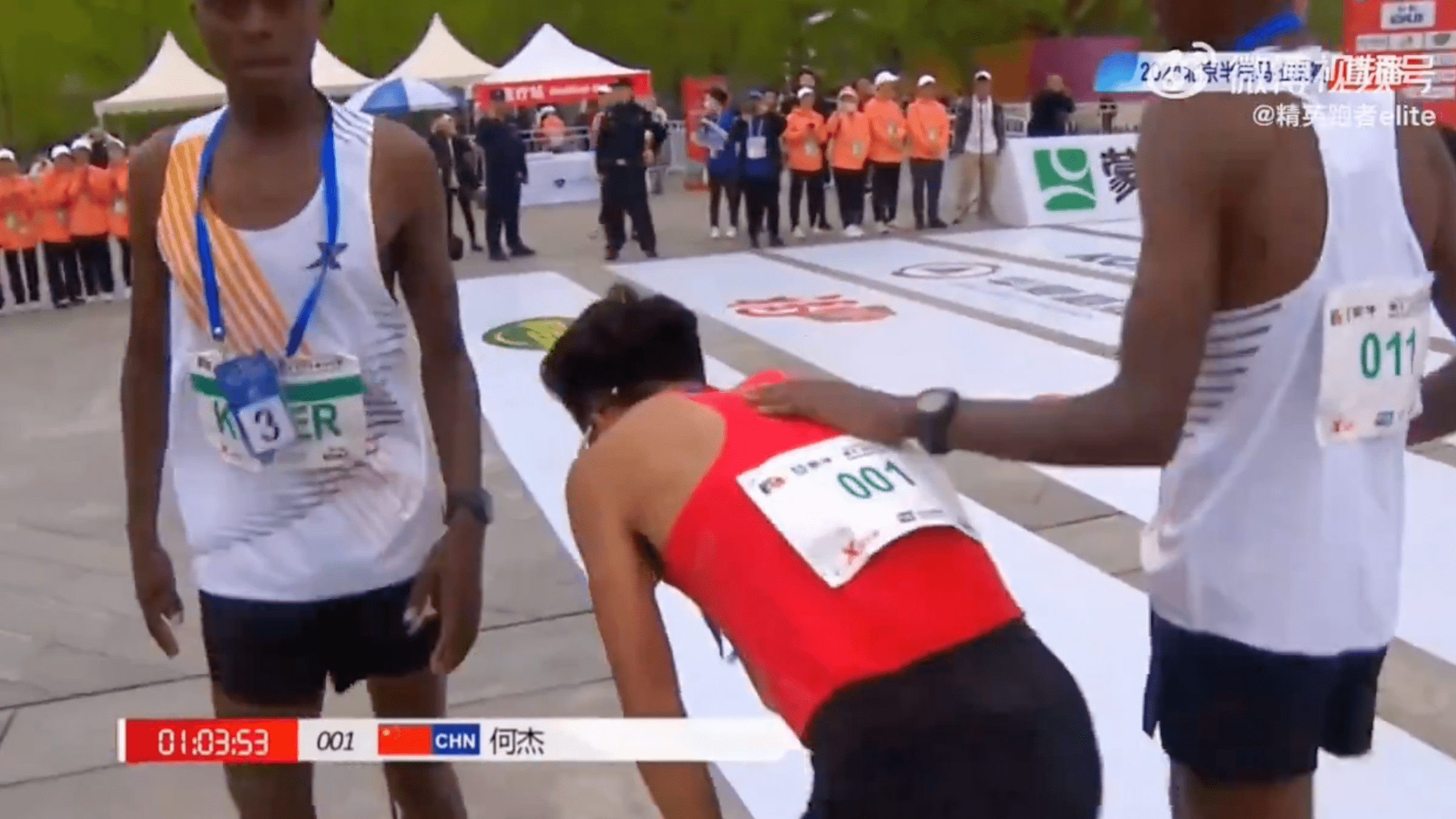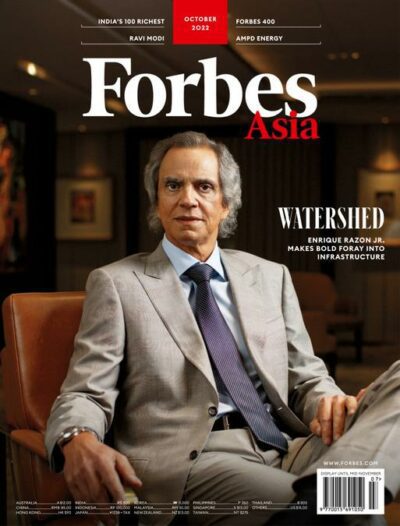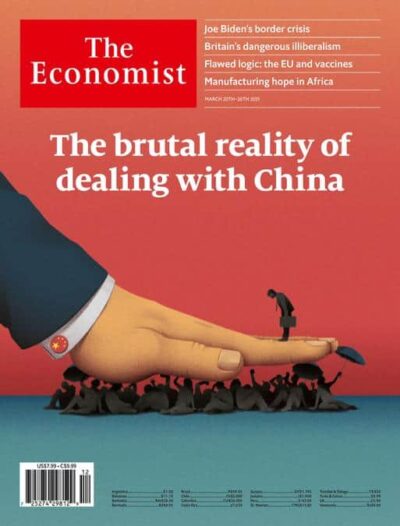

Viral Finish, Cheating Rumors at Beijing Half Marathon Make ‘Mockery’ of Chinese Running
It was a dramatic, film-worthy display of sportsmanship—or cheating, depending on how you see it.
[time-brightcove not-tgx=”true”]
In the last stretch of a half-marathon in Beijing on April 14, two runners from Kenya, one from Ethiopia, and one from China were in the lead—reportedly pacing with each other since the beginning. But as the group drew closer to the finish line, the Chinese athlete, 25-year-old Asian Games marathon gold medallist He Jie, began to fall behind. Apparently noticing this, the three East African runners appeared to slow down, ultimately giving He a small but significant headway that eventually led him to cross the tape first.
The Chinese crowd erupted in applause for their homegrown winner, but the moment was met with a different kind of uproar on social media, where it went viral in China and around the world.
“It seems like the foreign players didn’t even want to compete!” one Weibo user said. “It’s too fake,” said another. One popular clip of the moment shared on X and seen more than a million times called the event “rigged.” Chinese news outlet Sina Sports described the scene as “embarrassing,” saying it has “severely damaged” the reputation of Chinese marathons.
China Daily, a state-run news outlet, published an opinion piece on Tuesday that said the Beijing Half Marathon has become a “mockery” due to the affair. “Sports events are built on the pillars of openness and fairness. Any deviation not only undermines the essence of sports but also disrespects the spectators.”
The China Daily piece questioned in particular the role of Xtep, a Chinese sports brand that sponsored all four athletes as well as a fifth who was disqualified before the event reportedly due to “contractual conflicts.”
Local news outlet The Paper reported that Xtep has acknowledged an investigation is underway by the organizer Beijing Sports Competition Management and International Exchange Centre and that the Beijing Bureau of Sport initiated a probe after receiving feedback through its public hotline.
World Athletics, the international governing body of track and field sports, said in a statement shared with TIME: “We are aware of the footage circulating online from the Beijing Half Marathon and understand an investigation is currently being conducted by the relevant local authorities. The integrity of our sport is the highest priority at World Athletics. While this investigation is ongoing we are unable to provide further comment.”
Though many see the episode as scandalous, that’s not the case for Kenyan runner Willy Mnangat, who admitted to letting He overtake him to the finish line. “I was not there to compete,” Mnangat told the BBC. The Kenyan runner told the South China Morning Post that he was pacing for He because “he is my friend.” While pacesetters are common in the sport, Mnangat’s bib did not read “pace,” as is customary. The Kenyan argued that he doesn’t know why he was assigned a number when he was tasked to help He “break the national record,” which was a known goal for He going into the competition.
Mnangat’s fellow East African runners, Kenyan Robert Keter and Ethiopian Dejene Hailu Bikila have not commented on the incident.
Accusations in China of cheating in sports are not new, especially with distance running. In 2018, a half-marathon in Shenzhen was marred by controversy after 258 of its participants were accused of cheating, with some caught on traffic cameras taking shortcuts and others found to have hired imposters to help complete the race. And in 2019, on at least two occasions, female runners received lifetime bans by local organizers after being caught riding a bike during half- and full-marathon events.
In the end, despite the boost from his peers, He, already a decorated Chinese athlete, didn’t break the national half-marathon record on Sunday, completing the 21 km. run in 1 hr, 3 min., and 44 sec., 107 seconds slower than the best set by Zhaxi Ciren in February. He told the state-run Global Times he was not at his best during competition day due to illness but remains undeterred and looks forward to the Paris Olympics this summer. “Please believe in Chinese athletes,” he said. “I hope to showcase Chinese speed in Paris and let the world see the Chinese speed.”
But while the Beijing Half Marathon was meant to build momentum and enthusiasm for He and Chinese running ahead of the Olympics, observers lament that the fiasco at the finish line has instead cast a shadow over the notion that Chinese sportsmen can actually win fair and square.
Mark Dreyer, a Beijing-based journalist and commentator on Chinese sports and author of Sporting Superpower: An Insider’s View on China’s Quest to Be the Best, posted on X: “The most frustrating thing for someone (me) who has covered – and promoted – the Chinese sports scene for 15+ years is that we’re talking about this absolute car crash of a finish instead of a young, rising Chinese athlete continuing his preparations for Paris.”
Get the latest work and career updates delivered straight to your inbox by subscribing to our magazine category today. Stay informed and ahead of the game with Subscrb.
The content on this website has been curated from various sources and is for informational purposes only. We do not claim ownership of any of the content posted here, all rights belong to their respective authors. While we make every effort to ensure that the information is accurate and up-to-date, we cannot guarantee its completeness or accuracy. Any opinions or views expressed on this website are solely those of the original authors and do not necessarily represent our own. We do not endorse or take responsibility for the content or actions of external websites or individuals linked from this website. Any reliance on the information provided on this website is done at your own risk. Please note that this article was originally seen on the source website TIME, by the author Chad de Guzman
-
SALE!




Forbes Asia Magazine Subscription
From: RM220 / year -
SALE!


Fortune Magazine Subscription
From: RM118 / year -
OUT OF STOCK




The Economist Magazine Subscription
From: RM1530 / year -


Inc. Magazine Magazine Subscription
From: RM22 / year -


Consumer Reports Magazine Subscription
From: RM22 / year -


Harvard Business Review Magazine Subscription
From: RM83 / month -


Entrepreneur’s Startups Magazine Subscription
From: RM4 / year -


BILLIONAIRE Magazine Subscription
From: RM131 / year



